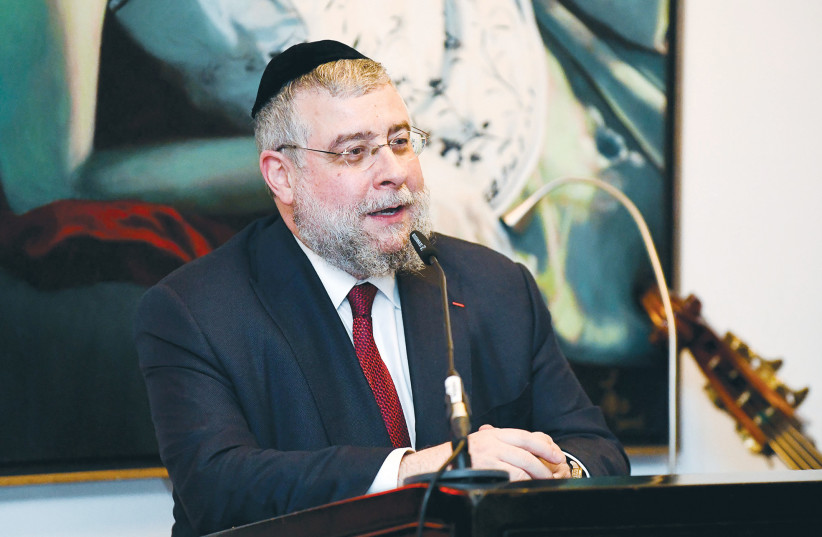Dozens of Orthodox rabbis from around the world signed a letter on Thursday calling on members of the government to allow amendment to the law for electing the chief rabbis, which cancels the age limit for candidates.
The elections for the Chief Rabbinate will take place at the beginning of August and there are many possible candidates who have been trying to gain political support in the electing body, which has 150 members.
The Chief Rabbinate is a powerful institution with jurisdiction over many aspects of Jewish life. The chief rabbis are elected for 10-year terms and represent the two main streams of Judaism in Israel: Ashkenazi and Sephardi.
“We call on the government and everyone involved in the election of the chief rabbi to do everything in your power to elect a scholar as the head of Israel’s Rabbinate,” they wrote. They added that “one of the duties of the chief rabbi is to become the leader of Israeli rabbis and to unite the entire people of Israel around the world.”
Therefore, they called upon “everyone who can, act in order for this important position to be filled by a talmid chacham (a person with extensive Torah knowledge) who is one of the greatest of our generation, and God forbid to limit candidates [from becoming chief rabbi] only because of their age, since in the disciples of the sages, an old age is itself an advantage.”

The letter was signed by many senior rabbis around the world, including Rabbi Pinchas Goldschmidt, president of the Conference of European Rabbis, Rabbi Menachem Genack, CEO of the Orthodox Union Kosher organization, Rabbi Berel Lazar, Chief Rabbi for Russia, Rabbi Aryeh Ralbag, heads the Beth Din on the Agudath HaRabbonime Rabbinical Association, Rav Zvi (Herschel) Schachter, Rosh Yeshiva at the Yeshiva University and many more.
The current Ashkenazi Chief Rabbi is David Lau; the current Sephardi Chief Rabbi is Yitzhak Yosef. Lau is considered moderate, and has been critical of some of the more extreme positions taken by the Chief Rabbinate in the past. Yosef, on the other hand, is more conservative and has been a vocal supporter of the Haredi community.
Only rabbis between the ages of 40-70 may run
According to the Chief Rabbinate law, in order to be eligible to be elected as the chief rabbi, one must be between the ages of 40 and 70 at the time of election and have the qualifications to be a judge in a rabbinic court or qualification to become a rabbi of a city. These two qualifications are based on the content they learned and were tested on. Over the years, there have been several attempts to cancel the age limit.
There have been speculations that the call for amending the law is actually about supporting the election of Rabbi Yaakov Shapira for the position, which, due to his age – 72 – isn’t relevant to date.
The list includes senior and chief rabbis from around the world such as Rotterdam Chief Rabbi Raphael Evers; Marseille Chief Rabbi Reuven Ohana; Vienna Chief Rabbi Yaron Engelmeier; Ukraine Chief Rabbi Moshe Reuven Azman; Frankfurt Rabbi Avichai Apel; Odessa Chief Rabbi Shlomo Bakshet; Rome Chief Rabbi Shmuel Di-Seni; Poland Chief Rabbi Michael Shudrich and Chile Chief Rabbi Eliyahu Tamim.
A few weeks ago, hundreds of Israeli rabbis called for the removal of the upper age limit “in a way that will allow the Torah greats who are worthy to serve as chief rabbis in Israel and who cannot, due to their age” make the Chief Rabbinate an institution which will resonate with more appreciation and respect, the rabbis wrote, hinting that the previous chief rabbis haven’t evoked such a positive attitude from most Israelis.
Among the hundreds of rabbis who signed the call were Jerusalem Old City Rabbi Avigdor Nebenzahl and Migdal HaEmek Rabbi Yitzchak Dovid Grossman, who is also a member of the Chief Rabbinate Council, as well as other senior rabbinic figures.
According to coalition agreements, Shas will receive government support in the voting body for their candidate for Sephardic Chief Rabbi, while Religious Zionist Party (RZP) will choose the government candidate for the Ashkenazi Chief Rabbi.
But a large sector of the religious-Zionist community and ultra-orthodox rabbis have expressed their preference for Rabbi Yaakov Shapira as chief rabbi – despite his age. RZP head Bezalel Smotrich has been trying to promote Rabbi Micha Halevi, rabbi of Petah Tikva. Halevi is considered closer to the more conservative spectrum of the religious-Zionist community, whereas Shapira is considered to be a “prince” of this community since his father was a chief rabbi decades ago and he himself is head of the main ideological institution for this community, the Mercaz Ha’Rav Yeshiva.
